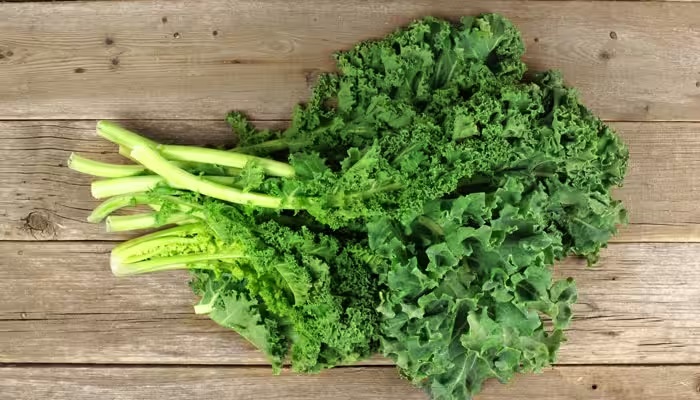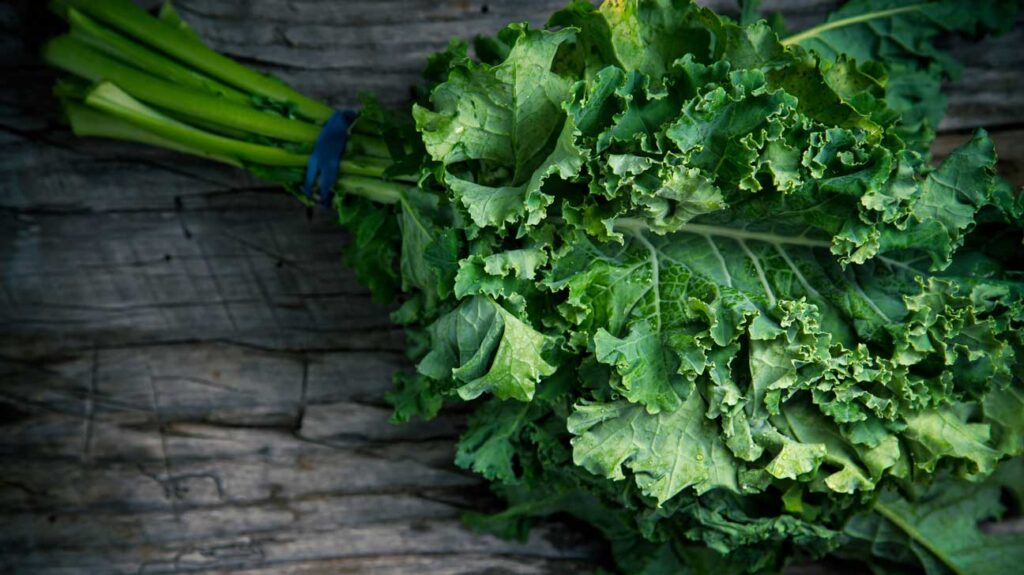Kale, a leafy green vegetable that has gained immense popularity in recent years, is often touted as a nutritional powerhouse and a superfood. With its vibrant green leaves and an impressive nutrient profile, kale has earned a well-deserved reputation as one of the healthiest foods on the planet. In this article, we will explore 15 extraordinary health benefits of kale in detail, from its rich nutrient content to its potential contributions to our health and overall well-being.
Kale’s Nutrient-Rich Profile
Before diving into the benefits of kale, you should check out the huge amount of different nutrients that kale possesses because kale’s status as a superfood is rooted in its remarkable nutrient density. It is packed with essential vitamins, minerals, antioxidants, and other beneficial compounds that make it a valuable addition to your diet. Here are some key components that make kale stand out.

Vitamins
Kale is rich in vitamins, particularly vitamin K, vitamin A, vitamin C, and several B vitamins. Vitamin K plays a crucial role in blood clotting, vitamin A is essential for healthy vision, vitamin C is an antioxidant that supports the immune system, and B vitamins aid in energy metabolism.
Minerals
Kale is a source of essential minerals such as calcium, magnesium, and potassium. From supporting bone health and muscle function to maintaining proper electrolyte balance, these minerals play a crucial role.
Fiber
Kale contains dietary fiber, which aids in digestion, helps control blood sugar levels, and supports heart health.
Antioxidants
Kale is rich in antioxidants, including flavonoids, carotenoids, and polyphenols, which help protect the body from oxidative stress and free radical damage.
Phytonutrients
Kale is abundant in phytonutrients like glucosinolates, which have been linked to cancer prevention and anti-inflammatory effects.
Omega-3 Fatty Acids
Kale contains small amounts of alpha-linolenic acid (ALA), a type of omega-3 fatty acid, which is important for heart and brain health.
15 Extraordinary Health Benefits of Kale!
So, we have known how much nutrient-dense kale is. Those nutrients definitely make kale a superfood that provides tons of health benefits. Without further ado, let’s know all the 15 benefits of kale one by one.

Rich in Vitamin K
Kale is one of the best dietary sources of vitamin K, particularly vitamin K1 (phylloquinone). Vitamin K is very important for blood clotting and supporting bone health. It aids in the activation of osteocalcin, a protein essential for bone mineralization.
Rich in Vitamin C
Kale is packed with vitamin C, a powerful antioxidant that supports the immune system, aids in wound healing, and promotes healthy skin. Moreover, vitamin C helps the body absorb iron from plant-based foods. So, these are some of the most amazing benefits of kale thanks to its vitamin C content.
Antioxidant Power
Kale contains a variety of antioxidants, including beta-carotene, quercetin, and kaempferol. These antioxidants help to protect the body from oxidative stress and reduce the risk of chronic diseases.
Supports Digestive Health
Kale is high in dietary fiber, which is essential for digestive health. Fiber is an excellent nutrient that promotes regular bowel movements, prevents constipation, and supports a healthy gut microbiome.

Supports Heart Health
Supporting heart health is one of the greatest health benefits of kale. Kale’s high potassium content helps regulate blood pressure, reducing the risk of hypertension and related cardiovascular issues. Additionally, the fiber and antioxidants in kale can help lower cholesterol levels and reduce the risk of heart disease.

Maintains Bone Health
As we already said, kale’s rich vitamin K content is essential for strong bones. It aids in bone mineralization and can reduce the risk of fractures and osteoporosis. This is really beneficial for individuals who suffer from weaker bone health or osteoarthritis.

Regulates Blood Sugar
The fiber and antioxidants in kale help regulate blood sugar levels by slowing the absorption of sugars from the digestive tract. This can be very beneficial for people with diabetes or those at risk of developing the condition.

Boosts Immune System
You have already known that kale is a rich source of vitamin C which is essential for the proper functioning of the immune system. It helps the body fight off infections and illnesses. A strong immune system is a must to attain an internally strong as well as healthy body so it’s undoubtedly one of the greatest health benefits of kale.

Anti-Inflammatory Properties
The antioxidants and phytonutrients in kale have anti-inflammatory properties that can help reduce inflammation in the body. This may lower the risk of chronic diseases associated with inflammation, such as arthritis and heart disease.
Helps in Weight Management
Kale like all the other leafy greens is a low-calorie, high-nutrient food that can be included in weight management and weight loss plans. Its high fiber content helps you feel full and satisfied, reducing overall calorie intake.
Supports Eye Health
Kale contains high levels of lutein and zeaxanthin, two antioxidants that are crucial for eye health. They can protect the eyes from age-related macular degeneration and cataracts. We all are well aware of the importance of eyes so it is certain that supporting eye health is one of the outstanding benefits of kale.

Helps to Prevent Cancer
The antioxidants in kale, including carotenoids and glucosinolates, have been linked to a reduced risk of certain cancers, particularly lung and breast cancer. These compounds help protect cells from damage and mutations that can lead to cancer. Thus, it is one of those remarkable benefits of kale that gives this leafy green the badge of “superfood”.

Improves Skin Health and Collagen Production
Kale’s high vitamin C content is essential for collagen production, which is vital for healthy and radiant skin. It also aids in wound healing and skin repair.
Supports Healthy Hair and Nails
The vitamins and minerals in kale support the health and growth of hair and nails, contributing to their strength and appearance.
Improves Cognitive Health
Kale is a source of folate, a B-vitamin important for cognitive health. It may help reduce the risk of age-related cognitive decline and support overall brain function.
Conclusion
Therefore, incorporating kale into your diet is a smart choice, whether you’re looking to boost your immune system, support digestive health, or enjoy the rich, earthy flavor of this remarkable leafy green. You can add kale to salads, smoothies, stir-fries, and soups, or simply sauté it with some garlic and olive oil as a nutritious side dish. So, embrace the remarkable health benefits of kale and elevate your health as well as nutrition with this green superfood. Hopefully, you found this article about the benefits of kale helpful enough. If you really did then let us know in the comment section down below. Thanks for visiting and appreciating our work.
